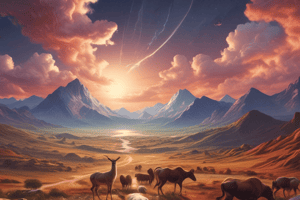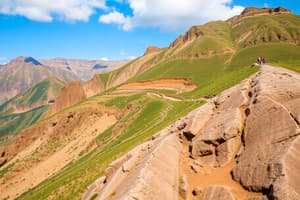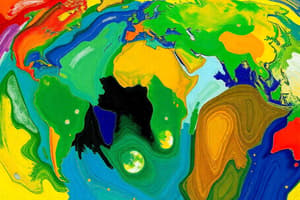Podcast
Questions and Answers
Quais são as duas principais categorias em que a geografia pode ser dividida?
Quais são as duas principais categorias em que a geografia pode ser dividida?
- Física e humana (correct)
- Natural e artificial
- Política e econômica
- Física e cultural
Qual é a posição da Terra em relação ao Sol?
Qual é a posição da Terra em relação ao Sol?
- Primeiro planeta
- Terceiro planeta (correct)
- Quinto planeta
- Sétimo planeta
Quais processos naturais são incluídos nos movimentos da Terra?
Quais processos naturais são incluídos nos movimentos da Terra?
- Tectônica, erosão e atividade sísmica (correct)
- Tectônica, gravidade e atividade meteorológica
- Gravidade, intensidade e atividade telúrica
- Erosão, sedimentação e atividade vulcânica
O que é necessário para entender para se orientar na Terra?
O que é necessário para entender para se orientar na Terra?
O que é estudado na Geografia para entender a orientação da Terra?
O que é estudado na Geografia para entender a orientação da Terra?
Para que serve o conceito de fuso horário?
Para que serve o conceito de fuso horário?
Quais movimentos são responsáveis pela formação de cadeias de montanhas e pela criação de bacias oceânicas?
Quais movimentos são responsáveis pela formação de cadeias de montanhas e pela criação de bacias oceânicas?
O que é fundamental para a navegação e a compreensão da distribuição de各种 características na superfície da Terra?
O que é fundamental para a navegação e a compreensão da distribuição de各种 características na superfície da Terra?
Quais são os critérios utilizados para divisão do mundo em 24 fusos horários?
Quais são os critérios utilizados para divisão do mundo em 24 fusos horários?
Por que a Geografia é importante para o futuro da humanidade?
Por que a Geografia é importante para o futuro da humanidade?
Study Notes
Geography: Understanding the World Around Us
Geography is the scientific study of the Earth's physical and cultural features. It involves understanding the natural world, human societies, and the interactions between them. In this article, we will explore various subtopics within geography, including categories of geography, the Earth in the universe, Earth movements, orientation, time zones, and Earth's natural wonders.
Categories of Geography
Geography can be divided into two main categories: physical geography and human geography. Physical geography deals with the natural features of the Earth, such as mountains, rivers, and climate, while human geography examines the cultural, political, and economic aspects of human societies. These two categories are interconnected, as human activities often have an impact on the natural environment, and the environment, in turn, shapes human societies.
The Earth in the Universe
The Earth is the third planet from the Sun and the fifth largest planet in the solar system. It is part of the Milky Way galaxy, which has about 100-400 billion stars. Space exploration has allowed us to study the Earth from different perspectives, which has led to a better understanding of our planet's place in the universe.
Earth Movements
Earth movements refer to the natural processes that shape the Earth's surface, including tectonic plate movements, erosion, and volcanic activity. These movements are responsible for the formation of mountain ranges, the creation of ocean basins, and the maintenance of the Earth's climate.
Orientation
Geography is also concerned with understanding the orientation of the Earth, which includes the study of latitude, longitude, and the Earth's magnetic fields. This knowledge is essential for navigation and understanding the distribution of various features on the Earth's surface.
Time Zones
Time zones are another aspect of geography that is influenced by the Earth's rotation. The world is divided into 24 time zones, which are determined by the Earth's longitude. Understanding time zones helps us understand how time is measured and used across the world.
Conclusion
Geography is a fascinating and diverse field of study that provides us with a deeper understanding of our world. By exploring its various subtopics, we can gain valuable insights into the natural environment, human societies, and the interactions between them. As we continue to explore and learn more about our planet, geography will remain a crucial discipline for understanding and preserving our world for future generations.
Studying That Suits You
Use AI to generate personalized quizzes and flashcards to suit your learning preferences.
Description
A geografia é o estudo científico das características físicas e culturais da Terra. Neste artigo, vamos explorar vários subtopics dentro da geografia, incluindo categorias de geografia, a Terra no universo, movimentos terrestres, orientação, fusos horários e maravilhas naturais da Terra.




